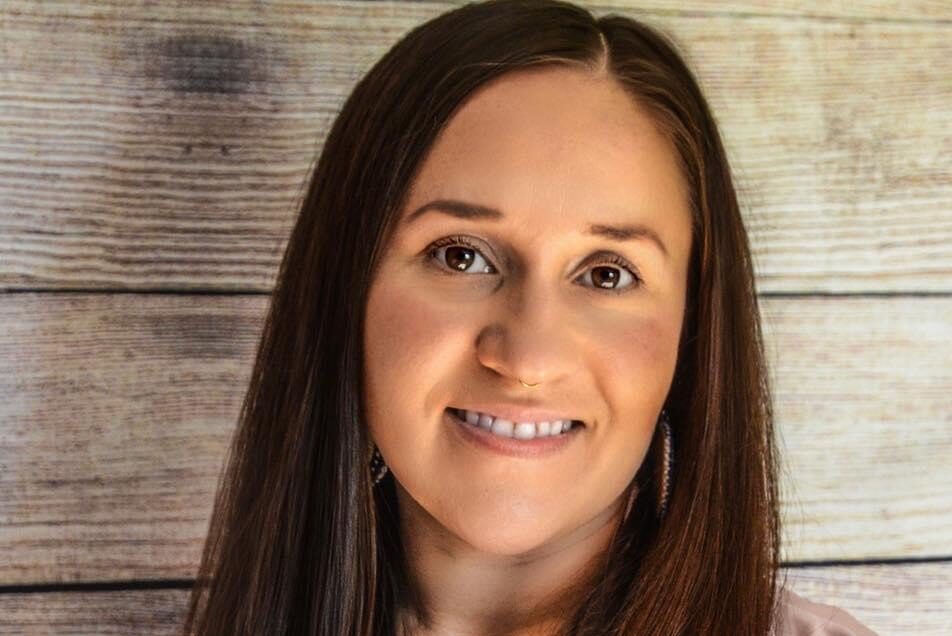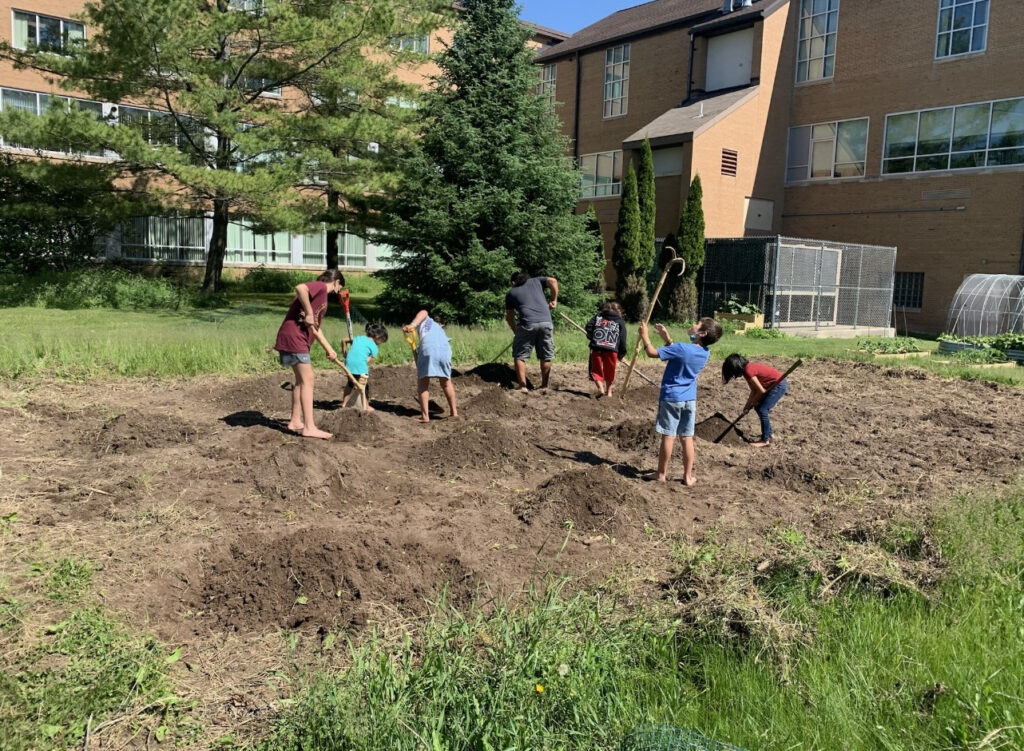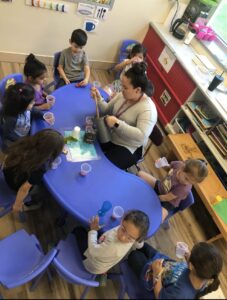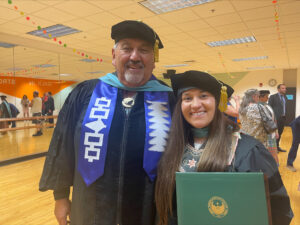
Dr. Yekuhsiyo Rosa King, one of the first graduates of UW-Green Bay’s First Nations Education Doctorate program. (Photo courtesy of Dr. King)
Each fall, students in the Oneida language immersion program excitedly harvest the bounty from the Three Sisters garden located at their school in Oneida, Wisconsin. What might appear to an outsider as a simple outdoor activity for energetic children is actually much, much more. In fact, it’s a key milestone along a year-long learning journey led by their teacher, Dr. Yekuhsiyo Rosa King, and inspired by her own education journey at UW-Green Bay.
Beginning in the spring, Oneida students build mounds and plant the Three Sisters seeds (first corn, then squash, finally beans). With each step along the way – culminating in braiding harvested corn for winter storage – the children absorb crucial concepts in math, meteorology, agriculture and nutrition. But the process also instills in them their community’s customs, values, history, songs and ceremonial practices and the cultural significance of every action.
Knowing how natural and valuable the Three Sisters garden project is for the program’s students, it’s hard for King to remember that it didn’t always unfold in such a holistic way. She first started teaching it on a mainstream school calendar that didn’t allow for the summertime experience of caring for the growing plants. Yet once King started her doctoral program in First Nations Education studies at the University of Wisconsin-Green Bay, she began to see new and better ways she could advance student learning by using their own language and culture.
Because of the wisdom and resources King gained from her experience at UW-Green Bay, the young minds in the program now attend their 180 days of school in a year-round configuration that emphasizes holistic curriculum instead of subject segmentation. They are more connected to their culture and more prepared for life inside and beyond their community.

Dr. King’s students use gardening tools as they plant the Three Sisters garden. (Photo courtesy of Dr. King)
Their lives are transforming before King’s eyes – not unlike the way her own life has transformed through her UW-Green Bay journey.
College, Community and Career
King grew up in the Green Bay area. Naturally curious and driven, she earned a bachelor’s degree in American Indian studies at the University of Minnesota Twin Cities and a master’s degree in tribal administration and government at the University of Minnesota Duluth.
In addition to her formal studies, she took on the very meaningful personal challenge of learning her native Oneida language with help from a friend in the community’s language department.
“When I first started my language studies, only two out of some 18,000 people spoke Oneida,” King recalls. Because of federal education policies, a lot of the language of the Oneida Nation, as well as most indigenous communities, is being lost and on the verge of extinction. Today, less than .0001% of Oneidas speak the language.
With such passion for her community and for learning, it is no surprise that King started her professional career working as a Native American advocate at a school district in Northeast Wisconsin.

Dr. King teaches 3–6-year-old children in the Oneida language immersion program she created. (Photo courtesy of Dr. King)
Language as Identity
Her appreciation for the endangered Oneida language grew during the five years she spent in her advocate role – and with it, a new determination to ensure its survival. King now understood the impact language and culture could have on her community. “Providing people with language gives a strong sense of identity, and when you’re strongly rooted, it guides you in all other areas of your life,” she explains. “There are a lot of social issues that affect our community, and if we can centralize our language and culture proactively, we can combat things like suicide and drug and alcohol use.”
King knew one of the best ways to revitalize a language was to instill it in children through immersion education, which means teaching through the use of only the target language. Yet at the time, there was no Oneida language immersion program.
So she started one.
The Birth of the Oneida Language Immersion Program
Since 2018, King has been teaching 3–6-year-olds in the Oneida language immersion program she created. Soon after she founded the program, she started looking for a new challenge to tackle – especially one that would enhance her leadership and teaching abilities within the program she founded.
“I always knew I would get my doctorate degree, but I didn’t know when,” King says. When her education networks started buzzing about a new, innovative First Nations Education Doctorate (FNED) program at UW-Green Bay, it didn’t take her long to decide to jump in with both feet.
Even though she had spent most of her life in the Green Bay area, King’s only experience with UW-Green Bay until that point was watching her mother earn her degree. Now, just a few years after her mom’s graduation, King herself was a Phoenix. She quickly realized she had made the right decision.
The 54-credit FNED program consists of core courses that address topics such as ancestral leadership, indigenous pedagogy, First Nations law and policy, generational healing and indigenous research methods. An applied dissertation project is the culmination of the doctoral program, and the students can direct their efforts into any area of their choosing. King’s focus? Indigenous language immersion education.
“Even though I was already doing the work, I needed an educational foundation in how to set up an immersive program so I could incorporate best practices into it,” King notes. “I got so much guidance and tools from my professors. No one else in our area is doing this, so they introduced me to things I never even knew existed!”
Flexibility and Financial Support Make the Difference

Dr. King holds her diploma and poses with fellow student Dr. Artley Skenandore at graduation. (Photo courtesy of Dr. King)
Balancing King’s career with her doctoral work was manageable because of the flexibility of the program. Classes meet only on weekends, and the students can tackle individual or group assignments on their own schedules.
UW-Green Bay also helped King with the financial aspect of pursuing higher education – as they do for 80% of first-year students at the university. “I received some monetary support from my community, but also from the university. They wanted us to be successful, so they were always there to help to reduce those financial barriers.”
Even though she worked full time throughout her doctoral pursuit, King earned her degree in just four years. In May 2022, she and her three fellow cohort members (Crystal Leah Tourtillott Lepscier, Artley Murray Skenandore Jr. and Vicki Lee Young) became the first cohort to graduate with an education doctorate in First Nations Education. Because King was the first to defend her dissertation, she was technically the first to graduate.
The Legacy of a Quality Education
The support King had come to rely on from UW-Green Bay didn’t end when she walked across the graduation stage.
“I think I’m even more connected to UW-Green Bay now than I was when I was in school!” laughs King. “I stay in touch with the cohorts that are pursuing their degrees to give guidance, but I also am in touch with so many of the new people I met during my doctoral work. I am now networked with other immersive programs around the world, so we share information and techniques to help strengthen and grow our programs.”
In fact, King recently attended the prestigious and influential National Coalition of Native Language Schools and Programs Summit. There, King learned from the industry’s top experts as a representative of the Oneida language immersion program – one of only 25 schools in the country invited to the event.
In this way, she says, UW-Green Bay’s FNED program is making an impact both locally and globally.
“As someone who works in education, I know it’s all about quality – never quantity,” King muses. “I was not just a number at UW-Green Bay; quality is the foundation there. It’s unmatched, and what I was able to do is so unique. I literally could not have done it anywhere else! I’m so grateful I was able to be a part of that.”
Rising Up
Before King arrived on campus, she was already a full-fledged trailblazer. With a doctoral degree in hand, she’s started to chart the next course.
“All the decisions I’ve made have directed me to where I am today,” she says. “My experience in the doctoral program was part of my journey and path. The support, mentorship and direction I got from UW-Green Bay helped me navigate this terrain I was building in my own community through language.
“It also helped me do a lot of inner work and crystallize what I value in this world: education and social justice. These are now at the forefront of my work as both a professional and as a person, and I’m doing it unapologetically so that I can make the path easier for others to walk.”
Many words can be used to describe the trail King is blazing: inspiring, impactful and impressive, to name a few. The same can be said for so many other Phoenix who – like King – use the incredible educational empowerment available at UW-Green Bay to chart their own unique courses toward personal and professional fulfillment.
Learn more about an Ed.D. in First Nations Education, degree options in First Nations Studies and how they’re empowering students to rise to their career potential.
This article was originally posted in the UW-Green Bay Alumni Spotlight.
Written by Kristin Bouchard
Link to story on UWGB’s site: https://news.uwgb.edu/featured/03/26/dr-rosa-kings-journey-to-and-through-first-nations-studies/
